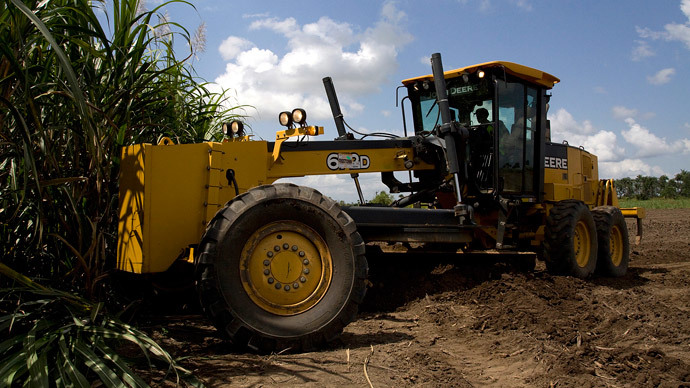‘Claims exaggerated’: Bioenergy challenges sustainable food future, study says

Innovative energy policy that promotes turning plants into fuel turns out to be quite controversial. It requires the use of agricultural land with little positive impact on the greenhouse effect, according to a new report from a global research group.
US and European governments have turned to biomass as a resource for liquid fuel or electricity, but billions of dollars of investment are unlikely to solve the problem of global energy demand, the World Resources Institute reported on Thursday.
“I would say that many of the claims for biofuels have been dramatically exaggerated,” Andrew Steer, president of the organization, told the New York Times. “There are other, more effective routes to get to a low-carbon world.”

The inefficiency of bioenergy strategy lies in the fact that it uses fertile land, which is a finite resource, while there is a 70 percent gap between the crop calories that were available in 2006 and the prognosis of the needs in 2050. The authors of the report also point out the lack of land for animal farming, as well as the drive “to conserve remaining natural ecosystems, … to protect freshwater resources, and to preserve the planet’s biological diversity.”
READ MORE: Bill Gates drinks cup of water that
used to be human poop (VIDEO)
“Using land to produce bioenergy is likely to compete with food production and carbon storage,” Timothy Searchinger, a Princeton University research scholar, reported. “This competition makes feeding the planet more difficult, likely triggers conversion of natural landscapes, and increases greenhouse gas emissions.”
However, some types of biofuels, especially wood waste like sawdust, present an ‘additional’ potential that could be successfully used. In Sweden, for instance, roughly one third of its energy is derived from forest waste, but in this Nordic country the population is rather small, the forestry sector is large, and most energy is expended on heating, which is “the most efficient use of biomass.”

Commenting on the abandoned farmland bioenergy production, Searchinger said it “might eventually be necessary to supply biofuels for applications such as aviation, it is likely to be expensive and should only be employed at scale to reduce greenhouse gas emissions after more cost-effective strategies are fully utilized.”
The growth of the wood-pellet industry in the EU and the US has been supported by governmental policies. In America, 30 to 40 percent of corn crop is turned into car fuel annually, which accounts for about six percent of the nation’s demand for gasoline.
READ MORE: 'Genetic firewall' discovery to make
GMOs containable, scientists say
The report examined the decade of rising concern of environmental groups and scientists about biofuel policies in Western countries, and proposed several measures to tackle the problem of economy alternative power sources, such as the introduction of low-carbon fuel standards. Among five proposed policy changes, the report urges to “fix laws in the accounting of the carbon dioxide consequences of bioenergy.”
In addition, the researchers urged to turn to wind and solar energy in reconsideration of current environmental and energy policies. The report calls solar energy systems producing electricity a more sustainable approach that “faces no serious natural resource limitations on its expansion that would drive up prices.”
The proponents of the theory of biomass energy have argued that, although carbon dioxide, a greenhouse gas, is emitted while such fuel burns, it could have no implications, as plants grow and continually replace each other.












